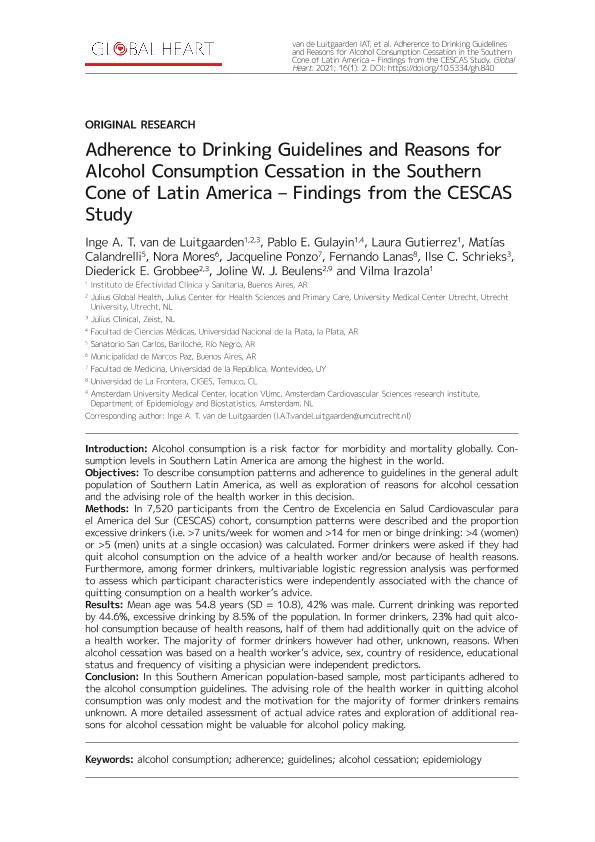Mostrar el registro sencillo del ítem
dc.contributor.author
Van de Luitgaarden, Inge A. T.
dc.contributor.author
Gulayin, Pablo Elías

dc.contributor.author
Gutierrez, Laura
dc.contributor.author
Calandrelli, Matías Enrique

dc.contributor.author
Mores, Nora Cecilia

dc.contributor.author
Ponzo, Jacqueline
dc.contributor.author
Lanas, Fernando
dc.contributor.author
Schrieks, Ilse C.
dc.contributor.author
Grobbee, Diederick E.
dc.contributor.author
Beulens, Joline W. J.
dc.contributor.author
Irazola, Vilma

dc.date.available
2023-09-19T10:06:13Z
dc.date.issued
2021-01
dc.identifier.citation
Van de Luitgaarden, Inge A. T.; Gulayin, Pablo Elías; Gutierrez, Laura; Calandrelli, Matías Enrique; Mores, Nora Cecilia; et al.; Adherence to drinking guidelines and reasons for alcohol consumption cessation in the southern cone of latin America – Findings from the CESCAS study; Ubiquity Press; Global Heart; 16; 1; 1-2021; 1-13
dc.identifier.issn
2211-8179
dc.identifier.uri
http://hdl.handle.net/11336/211914
dc.description.abstract
Introduction: Alcohol consumption is a risk factor for morbidity and mortality globally. Consumption levels in Southern Latin America are among the highest in the world. Objectives: To describe consumption patterns and adherence to guidelines in the general adult population of Southern Latin America, as well as exploration of reasons for alcohol cessation and the advising role of the health worker in this decision. Methods: In 7,520 participants from the Centro de Excelencia en Salud Cardiovascular para el America del Sur (CESCAS) cohort, consumption patterns were described and the proportion excessive drinkers (i.e. >7 units/week for women and >14 for men or binge drinking: >4 (women) or >5 (men) units at a single occasion) was calculated. Former drinkers were asked if they had quit alcohol consumption on the advice of a health worker and/or because of health reasons. Furthermore, among former drinkers, multivariable logistic regression analysis was performed to assess which participant characteristics were independently associated with the chance of quitting consumption on a health worker’s advice. Results: Mean age was 54.8 years (SD = 10.8), 42% was male. Current drinking was reported by 44.6%, excessive drinking by 8.5% of the population. In former drinkers, 23% had quit alcohol consumption because of health reasons, half of them had additionally quit on the advice of a health worker. The majority of former drinkers however had other, unknown, reasons. When alcohol cessation was based on a health worker’s advice, sex, country of residence, educational status and frequency of visiting a physician were independent predictors. Conclusion: In this Southern American population-based sample, most participants adhered to the alcohol consumption guidelines. The advising role of the health worker in quitting alcohol consumption was only modest and the motivation for the majority of former drinkers remains unknown. A more detailed assessment of actual advice rates and exploration of additional reasons for alcohol cessation might be valuable for alcohol policy making.
dc.format
application/pdf
dc.language.iso
eng
dc.publisher
Ubiquity Press
dc.rights
info:eu-repo/semantics/openAccess
dc.rights.uri
https://creativecommons.org/licenses/by-nc-sa/2.5/ar/
dc.subject
ADHERENCE
dc.subject
ALCOHOL CESSATION
dc.subject
ALCOHOL CONSUMPTION
dc.subject
EPIDEMIOLOGY
dc.subject
GUIDELINES
dc.subject.classification
Otras Ciencias de la Salud

dc.subject.classification
Ciencias de la Salud

dc.subject.classification
CIENCIAS MÉDICAS Y DE LA SALUD

dc.title
Adherence to drinking guidelines and reasons for alcohol consumption cessation in the southern cone of latin America – Findings from the CESCAS study
dc.type
info:eu-repo/semantics/article
dc.type
info:ar-repo/semantics/artículo
dc.type
info:eu-repo/semantics/publishedVersion
dc.date.updated
2023-09-13T11:58:07Z
dc.journal.volume
16
dc.journal.number
1
dc.journal.pagination
1-13
dc.journal.pais
Reino Unido

dc.description.fil
Fil: Van de Luitgaarden, Inge A. T.. Instituto de Efectividad Clínica y Sanitaria; Argentina
dc.description.fil
Fil: Gulayin, Pablo Elías. Universidad Nacional de La Plata. Facultad de Ciencias Médicas; Argentina. Instituto de Efectividad Clínica y Sanitaria; Argentina
dc.description.fil
Fil: Gutierrez, Laura. Instituto de Efectividad Clínica y Sanitaria; Argentina
dc.description.fil
Fil: Calandrelli, Matías Enrique. No especifíca;
dc.description.fil
Fil: Mores, Nora Cecilia. No especifíca;
dc.description.fil
Fil: Ponzo, Jacqueline. Universidad de la República; Uruguay
dc.description.fil
Fil: Lanas, Fernando. Universidad de La Frontera; Chile
dc.description.fil
Fil: Schrieks, Ilse C.. No especifíca;
dc.description.fil
Fil: Grobbee, Diederick E.. University of Utrecht; Países Bajos
dc.description.fil
Fil: Beulens, Joline W. J.. University of Utrecht; Países Bajos
dc.description.fil
Fil: Irazola, Vilma. Consejo Nacional de Investigaciones Científicas y Técnicas. Oficina de Coordinación Administrativa Parque Centenario. Centro de Investigaciones en Epidemiología y Salud Pública. Instituto de Efectividad Clínica y Sanitaria. Centro de Investigaciones en Epidemiología y Salud Pública; Argentina
dc.journal.title
Global Heart
dc.relation.alternativeid
info:eu-repo/semantics/altIdentifier/doi/http://dx.doi.org/10.5334/GH.840
Archivos asociados
